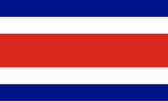
Call 0330 880 3600 Calls may be monitored or recorded. Opening Times.
- TRAVEL INSURANCE
- COVID-19 COVER
- More Options
- Help & Advice
- Existing Customers

Call 0330 880 3600 Calls may be monitored or recorded. Opening Times.

Need help?
UK Customer Services0330 880 3600*
Open Monday to Friday 9:00am to 6pm, Saturday 8:30am to 4pm and closed Sundays.
*Calls are recorded for training and quality purposes.

Official name: Republic of Costa Rica
Capital city: San José
Official language: Spanish, English
Population: About 5.4 million
Currency: Costa Rican colón (CRC)
Time zone: GMT-6
Driving side: Right
Climate: Tropical, with a rainy season from May to November and a dry season from December to April. Cooler in the central highlands.
Costa Rica is one of Central America’s most popular destinations, celebrated for its biodiversity, eco-tourism, and reputation as the “Switzerland of Central America” thanks to its stability and focus on conservation. Around a quarter of the country is protected national park or reserve, home to cloud forests, volcanoes, and exotic wildlife. San José is a lively capital, while the Pacific and Caribbean coasts draw surfers, beach lovers, and adventure travellers alike.
Bordered by Nicaragua to the north and Panama to the south, Costa Rica also has coastlines on both the Pacific Ocean and Caribbean Sea. The central highlands are dominated by active volcanoes such as Arenal, Poás, and Irazú, while the country’s fertile valleys support coffee and banana production. Lowland rainforests, mangroves, and beaches add to the diversity. Earthquakes and volcanic eruptions are occasional natural hazards, while flooding can occur during the rainy season.
Juan Santamaría International Airport near San José is the main gateway, with Liberia airport in Guanacaste handling growing numbers of tourist arrivals. Internal flights and reliable bus services connect most parts of the country. Roads are improving but can be narrow and winding, and driving in rural areas requires caution. Eco-tourism is Costa Rica’s speciality, with activities ranging from wildlife watching and canopy tours to white-water rafting, surfing, and hiking. The country is generally safe for visitors, though petty theft can be an issue in tourist areas.
British citizens and most visitors from Europe and North America can enter Costa Rica without a visa for stays of up to 90 days. Passports must be valid for the duration of stay and visitors may be asked to show onward or return tickets. For longer stays, visas or extensions must be arranged with local immigration authorities. The Costa Rican Embassy in London provides consular assistance, while the British Embassy in San José supports UK nationals.
The Costa Rican colón (CRC) is the official currency, though US dollars are widely accepted, especially in tourist regions. ATMs are plentiful in cities and larger towns, and credit cards are accepted in most hotels, restaurants, and shops. However, carrying some cash is advisable for smaller businesses and rural areas.
Healthcare standards in Costa Rica are generally good, particularly in San José and other major cities, with both public and private hospitals available. Medical services outside urban centres are more limited. Travellers should ensure they have comprehensive insurance, including evacuation cover. Tap water is safe to drink in many areas, though bottled water is recommended in rural regions. Vaccinations for hepatitis A and typhoid are recommended, and proof of yellow fever vaccination is required if arriving from certain countries. Mosquito-borne illnesses such as dengue, chikungunya, and Zika virus can occur, especially in lowland areas.